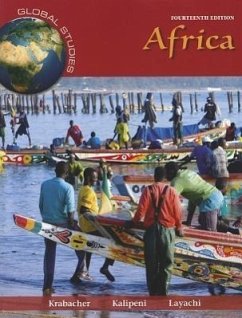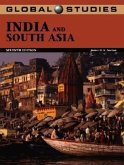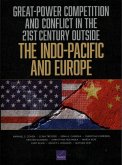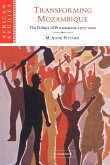- Broschiertes Buch
- Merkliste
- Auf die Merkliste
- Bewerten Bewerten
- Teilen
- Produkt teilen
- Produkterinnerung
- Produkterinnerung
Global Studies is a unique series designed to provide comprehensive background information and selected world press articles on the regions and countries of the world. Each Global Studies volume includes an annotated listing of World Wide Web sites and is now supported by an online Instructor's Resource Guide. Visit our website for more information: www.mhhe.com/globalstudies.
Andere Kunden interessierten sich auch für
![Latin America Latin America]() Paul B. GoodwinLatin America50,99 €
Paul B. GoodwinLatin America50,99 €![Global Studies: Japan and the Pacific Rim Global Studies: Japan and the Pacific Rim]() Dean W. CollinwoodGlobal Studies: Japan and the Pacific Rim43,99 €
Dean W. CollinwoodGlobal Studies: Japan and the Pacific Rim43,99 €![Japan and the Pacific Rim Japan and the Pacific Rim]() Dean W. CollinwoodJapan and the Pacific Rim60,99 €
Dean W. CollinwoodJapan and the Pacific Rim60,99 €![Global Studies: India and South Asia Global Studies: India and South Asia]() James K. NortonGlobal Studies: India and South Asia41,99 €
James K. NortonGlobal Studies: India and South Asia41,99 €![Great-Power Competition and Conflict in the 21st Century Outside the Indo-Pacific and Europe Great-Power Competition and Conflict in the 21st Century Outside the Indo-Pacific and Europe]() Raphael S CohenGreat-Power Competition and Conflict in the 21st Century Outside the Indo-Pacific and Europe60,99 €
Raphael S CohenGreat-Power Competition and Conflict in the 21st Century Outside the Indo-Pacific and Europe60,99 €![Transforming Mozambique Transforming Mozambique]() M. Anne PitcherTransforming Mozambique38,99 €
M. Anne PitcherTransforming Mozambique38,99 €![Blood, Land, and Sex Blood, Land, and Sex]() Lyda FavaliBlood, Land, and Sex31,99 €
Lyda FavaliBlood, Land, and Sex31,99 €-
-
-
Global Studies is a unique series designed to provide comprehensive background information and selected world press articles on the regions and countries of the world. Each Global Studies volume includes an annotated listing of World Wide Web sites and is now supported by an online Instructor's Resource Guide. Visit our website for more information: www.mhhe.com/globalstudies.
Hinweis: Dieser Artikel kann nur an eine deutsche Lieferadresse ausgeliefert werden.
Hinweis: Dieser Artikel kann nur an eine deutsche Lieferadresse ausgeliefert werden.
Produktdetails
- Produktdetails
- Global Studies (Paperback)
- Verlag: Dushkin Publishing
- Seitenzahl: 448
- Altersempfehlung: ab 18 Jahre
- Erscheinungstermin: März 2012
- Englisch
- Abmessung: 272mm x 213mm x 23mm
- Gewicht: 1021g
- ISBN-13: 9780078026232
- ISBN-10: 0078026237
- Artikelnr.: 34157704
- Herstellerkennzeichnung
- Libri GmbH
- Europaallee 1
- 36244 Bad Hersfeld
- gpsr@libri.de
- Global Studies (Paperback)
- Verlag: Dushkin Publishing
- Seitenzahl: 448
- Altersempfehlung: ab 18 Jahre
- Erscheinungstermin: März 2012
- Englisch
- Abmessung: 272mm x 213mm x 23mm
- Gewicht: 1021g
- ISBN-13: 9780078026232
- ISBN-10: 0078026237
- Artikelnr.: 34157704
- Herstellerkennzeichnung
- Libri GmbH
- Europaallee 1
- 36244 Bad Hersfeld
- gpsr@libri.de
UNIT 1: Africa: Facing the Challenges of the 21st Century
Africa Map
UNIT 2: Central Africa: Possibilities for Cooperation
Central Africa Map
Chapter 1: Cameroon (Republic of Cameroon)
Chapter 2: Central African Republic
Chapter 3: Chad (Republic of Chad)
Chapter 4: Congo (Republic of the Congo; Congo-Brazzaville)
Chapter 5: Democratic Republic of the Congo (Congo-Kinshasa; formerly
Zaire)
Chapter 6: Equatorial Guinea (Republic of Equatorial Guinea)
Chapter 7: Gabon (Gabonese Republic)
Chapter 8: São Tomé and Príncipe (Democratic Republic of São Tomé and
Príncipe)
UNIT 3: East Africa: A Mixed Inheritance
East Africa Map
Chapter 9: Burundi (Republic of Burundi)
Chapter 10: Comoros (Union of Comoros)
Chapter 11: Djibouti (Republic of Djibouti)
Chapter 12: Eritrea (State of Eritrea)
Chapter 13: Ethiopia (Federal Democratic Republic of Ethiopia)
Chapter 14: Kenya (Republic of Kenya)
Chapter 15: Madagascar (Republic of Madagascar)
Chapter 16: Mauritius (Republic of Mauritius)
Chapter 17: Rwanda (Rwandese Republic)
Chapter 18: Seychelles (Republic of Seychelles)
Chapter 19: Somalia
Chapter 20: South Sudan (Republic of South Sudan)
Chapter 21: Tanzania (United Republic of Tanzania)
Chapter 22: Uganda (Republic of Uganda)
UNIT 4: North Africa: The Crossroads of the Continent
North Africa Map
Chapter 23: Algeria (Peoples' Democratic Republic of Algeria)
Chapter 24: Egypt (Arab Republic of Egypt)
Chapter 25: Libya (Socialist People's Libyan Arab Jamahiriyya)
Chapter 26: Morocco (Kingdom of Morocco)
Chapter 27: Sudan (Republic of Sudan)
Chapter 28: Tunisia (Republic of Tunisia)
Chapter 29: Western Sahara
UNIT 5: Southern Africa: The Continuing Struggle for Self-Determination
Southern Africa Map
Chapter 30: Angola (Republic of Angola)
Chapter 31: Botswana (Republic of Botswana)
Chapter 32: Lesotho (Kingdom of Lesotho)
Chapter 33: Malawi (Republic of Malawi)
Chapter 34: Mozambique (Republic of Mozambique)
Chapter 35: Namibia (Republic of Namibia)
Chapter 36: South Africa (Republic of South Africa)
Chapter 37: Swaziland (Kingdom of Swaziland)
Chapter 38: Zambia (Republic of Zambia)
Chapter 39: Zimbabwe (Republic of Zimbabwe)
UNIT 6: West Africa: Seeking Unity in Diversity
West Africa Map
Chapter 40: Benin (Republic of Benin)
Chapter 41: Burkina Faso
Chapter 42: Cape Verde (Republic of Cape Verde)
Chapter 43: Côte d'lvoire (Republic of Côte d'lvoire)
Chapter 44: The Gambia (Republic of The Gambia)
Chapter 45: Ghana (Republic of Ghana)
Chapter 46: Guinea (Republic of Guinea)
Chapter 47: Guinea-Bissau (Republic of Guinea-Bissau)
Chapter 48: Liberia (Republic of Liberia)
Chapter 49: Mali (Republic of Mali)
Chapter 50: Mauritania (Islamic Republic of Mauritania)
Chapter 51: Niger (Republic of Niger)
Chapter 52: Nigeria (Federal Republic of Nigeria)
Chapter 53: Senegal (Republic of Senegal)
Chapter 54: Sierra Leone (Republic of Sierra Leone)
Chapter 55: Togo (Togolese Republic) 370
UNIT 7: Articles From the World Press
Refugees Are Fleeing the Weather: More Than 25 Million Could Be Displaced
by 2050, Edmund Sanders, The Los Angeles Times, October 25, 2009
Climate change is expected to create as many as 25 million refugees
globally by 2050, at which point climate refugees are expected to outnumber
those resulting from war and persecution. The impact will be particularly
severe in Africa where a large percentage of the population remains
agrarian, with livelihoods directly dependent on the climatic conditions.
Increasing drought is expected to be the greatest problem, as present-day
conditions in much of East Africa illustrate.
Upwardly Mobile in Africa, Jack Ewing, Bloomberg Business Week, September
13, 2007
Mobile phones are changing the developing world faster than anyone would
have imagined a decade ago and nowhere has the impact been more dramatic
than in Africa, where such technology often represents the first modern
infrastructure of any kind. As this article reports, mobile phones can
dramatically improve living standards, even for people living on just a few
dollars a day.
Africa's Capitalist Revolutions, Ethan B. Kapstein, Foreign Affairs,
July-August, 2009
For all its poverty and underdevelopment, Africa has experienced major
economic growth over the past decade, a dramatic change from the pessimism
of the 1990s. The author argues that much of this is due to the free-market
capitalism that is flourishing across much of the continent. The author
also notes, however, that in many cases weak democratic governments and the
poor global economy pose significant threats to continued economic
progress.
In Scramble for Land, Group Says, Company Pushed Ugandans Out, Josh Kron,
The New York Times, September 21, 2011
As the demand for agricultural land increases worldwide, foreign investors
frequently purchase rural land in Africa in order to grow food for
commercial sale on world markets or, as in the case described here, to
plant forests as part of the carbon-credit trade to fight global warming.
The problem is that such actions often come at the expense of Africa's
local farmers who are dispossessed from their farms to make way for foreign
investors.
Network Effects: Connectivity and Commitment Pay Dividends in African
Transport, The Economist, October 2008
The lack of modern transportation infrastructure remains one of the biggest
obstacles to Africa's economic development. Without working rail networks,
paved roadways, and efficient port facilities, the movement of people, raw
materials and finished goods remains unreliable and often prohibitively
expensive. This article examines the efforts by international entrepreneurs
to help address this situation.
South Africa Resists March of Walmart, Richard Wachman, The Guardian,
October 10, 2011
Walmart's attempt to buy a major South Africa supermarket chain as a way of
gaining a foothold in the South African market (and eventually the African
market in general) has run into serious opposition by unions, politicians,
and small business owners who oppose the move. Their concern is that
Walmart's business practices and sheer economic clout pose a significant
threat to local small businesses and could lead to declining wages and
increased unemployment in many South African job sectors, as evidenced by
Walmart's impact elsewhere.
The Three Biggest Threats to Newly Independent South Sudan, Eric Reeves,
The New Republic (online), July 9, 2011
The birth of the Independent Republic of South Sudan in July, 2011 was a
cause for celebration and hope, offering as it did the possibility of an
end to decades of civil war and ethnic violence. The establishment of the
new state, however, does not guarantee peace. Threats, in the form of
renegade militias, on-going border conflicts with Sudan to the north, and
internal political disputes could continue well into the foreseeable
future.
Africa's Forever Wars, Jeffrey Gettleman, Foreign Policy, March/April 2010
Africa's seeming state of perpetual warfare is a result of the fact that
Africa's conflicts, for the most part, do not fit the traditional
definition of "war." Increasingly, conflicts are not the result of parties
fighting to impose ideologies or to seek political control-a situation of
soldier vs. soldier-but rather they take the form of heavily armed banditry
in which the victims are mostly civilians. In recent years, approximately
half of all countries in Africa have faced, or are currently facing,
violence of this kind.
The Limits of Smart Power, David Axe, American Prospect (online), November
29, 2010
In October 2011 President Barack Obama announced that the United States was
sending military advisors to East Africa to help countries counter the
threat posed by the Lord's Resistance Army (LRA). Relatively unknown in the
West, the LRA is an outlaw group responsible for horrific rural violence in
Uganda, Sudan, the Central African Republic, and the Congo in recent years.
Dealing with groups like the LRA poses a difficult challenge for the
outside world, including the United States, because legitimate government
forces, such as the Congolese army, are frequently perpetrators of rural
violence themselves .
Desmond Tutu's Dreams for Cape Town Fade as Informal Apartheid Grips the
City, David Smith, The Observer, October 8, 2011
Cape Town is one of the world's great tourist destinations, but two decades
after Desmond Tutu made it a shining city of defiance against apartheid,
Cape Town, at least for the majority of its population, is finding economic
liberation harder to achieve than the political kind. Centuries of colonial
oppression and decades of official segregation have resulted in a de facto
economic apartheid where the majority of the population continues to live
in severe poverty, despite the city's glittering international image. South
Africa's post-apartheid government has made efforts to remedy this, but
given the enormity of the problem it is likely to persist for decades to
come.
Ellen Johnson Sirleaf Faces a Tough Presidential Election in Liberia, The
Guardian, October 9, 2011
In 2005 Ellen Johnson Sirleaf, Africa's first female head of state, took
office as President of Liberia, assuming leadership of a country that had
been devastated by 14 years of civil war. Since then she has made
significant progress in rebuilding both the country's economy and its civil
society, for which she shared the 2011 Nobel Peace Prize. Such
accomplishments were not necessarily enough, however, for many Liberian
voters disillusioned by the many problems the country still faces, as her
bid for reelection in Fall 2011 showed.
Internet References
Appendix A: United States Map and Statistics
Appendix B: Canada Map and Statistics
Glossary of Terms and Abbreviations
Bibliography
Index
Africa Map
UNIT 2: Central Africa: Possibilities for Cooperation
Central Africa Map
Chapter 1: Cameroon (Republic of Cameroon)
Chapter 2: Central African Republic
Chapter 3: Chad (Republic of Chad)
Chapter 4: Congo (Republic of the Congo; Congo-Brazzaville)
Chapter 5: Democratic Republic of the Congo (Congo-Kinshasa; formerly
Zaire)
Chapter 6: Equatorial Guinea (Republic of Equatorial Guinea)
Chapter 7: Gabon (Gabonese Republic)
Chapter 8: São Tomé and Príncipe (Democratic Republic of São Tomé and
Príncipe)
UNIT 3: East Africa: A Mixed Inheritance
East Africa Map
Chapter 9: Burundi (Republic of Burundi)
Chapter 10: Comoros (Union of Comoros)
Chapter 11: Djibouti (Republic of Djibouti)
Chapter 12: Eritrea (State of Eritrea)
Chapter 13: Ethiopia (Federal Democratic Republic of Ethiopia)
Chapter 14: Kenya (Republic of Kenya)
Chapter 15: Madagascar (Republic of Madagascar)
Chapter 16: Mauritius (Republic of Mauritius)
Chapter 17: Rwanda (Rwandese Republic)
Chapter 18: Seychelles (Republic of Seychelles)
Chapter 19: Somalia
Chapter 20: South Sudan (Republic of South Sudan)
Chapter 21: Tanzania (United Republic of Tanzania)
Chapter 22: Uganda (Republic of Uganda)
UNIT 4: North Africa: The Crossroads of the Continent
North Africa Map
Chapter 23: Algeria (Peoples' Democratic Republic of Algeria)
Chapter 24: Egypt (Arab Republic of Egypt)
Chapter 25: Libya (Socialist People's Libyan Arab Jamahiriyya)
Chapter 26: Morocco (Kingdom of Morocco)
Chapter 27: Sudan (Republic of Sudan)
Chapter 28: Tunisia (Republic of Tunisia)
Chapter 29: Western Sahara
UNIT 5: Southern Africa: The Continuing Struggle for Self-Determination
Southern Africa Map
Chapter 30: Angola (Republic of Angola)
Chapter 31: Botswana (Republic of Botswana)
Chapter 32: Lesotho (Kingdom of Lesotho)
Chapter 33: Malawi (Republic of Malawi)
Chapter 34: Mozambique (Republic of Mozambique)
Chapter 35: Namibia (Republic of Namibia)
Chapter 36: South Africa (Republic of South Africa)
Chapter 37: Swaziland (Kingdom of Swaziland)
Chapter 38: Zambia (Republic of Zambia)
Chapter 39: Zimbabwe (Republic of Zimbabwe)
UNIT 6: West Africa: Seeking Unity in Diversity
West Africa Map
Chapter 40: Benin (Republic of Benin)
Chapter 41: Burkina Faso
Chapter 42: Cape Verde (Republic of Cape Verde)
Chapter 43: Côte d'lvoire (Republic of Côte d'lvoire)
Chapter 44: The Gambia (Republic of The Gambia)
Chapter 45: Ghana (Republic of Ghana)
Chapter 46: Guinea (Republic of Guinea)
Chapter 47: Guinea-Bissau (Republic of Guinea-Bissau)
Chapter 48: Liberia (Republic of Liberia)
Chapter 49: Mali (Republic of Mali)
Chapter 50: Mauritania (Islamic Republic of Mauritania)
Chapter 51: Niger (Republic of Niger)
Chapter 52: Nigeria (Federal Republic of Nigeria)
Chapter 53: Senegal (Republic of Senegal)
Chapter 54: Sierra Leone (Republic of Sierra Leone)
Chapter 55: Togo (Togolese Republic) 370
UNIT 7: Articles From the World Press
Refugees Are Fleeing the Weather: More Than 25 Million Could Be Displaced
by 2050, Edmund Sanders, The Los Angeles Times, October 25, 2009
Climate change is expected to create as many as 25 million refugees
globally by 2050, at which point climate refugees are expected to outnumber
those resulting from war and persecution. The impact will be particularly
severe in Africa where a large percentage of the population remains
agrarian, with livelihoods directly dependent on the climatic conditions.
Increasing drought is expected to be the greatest problem, as present-day
conditions in much of East Africa illustrate.
Upwardly Mobile in Africa, Jack Ewing, Bloomberg Business Week, September
13, 2007
Mobile phones are changing the developing world faster than anyone would
have imagined a decade ago and nowhere has the impact been more dramatic
than in Africa, where such technology often represents the first modern
infrastructure of any kind. As this article reports, mobile phones can
dramatically improve living standards, even for people living on just a few
dollars a day.
Africa's Capitalist Revolutions, Ethan B. Kapstein, Foreign Affairs,
July-August, 2009
For all its poverty and underdevelopment, Africa has experienced major
economic growth over the past decade, a dramatic change from the pessimism
of the 1990s. The author argues that much of this is due to the free-market
capitalism that is flourishing across much of the continent. The author
also notes, however, that in many cases weak democratic governments and the
poor global economy pose significant threats to continued economic
progress.
In Scramble for Land, Group Says, Company Pushed Ugandans Out, Josh Kron,
The New York Times, September 21, 2011
As the demand for agricultural land increases worldwide, foreign investors
frequently purchase rural land in Africa in order to grow food for
commercial sale on world markets or, as in the case described here, to
plant forests as part of the carbon-credit trade to fight global warming.
The problem is that such actions often come at the expense of Africa's
local farmers who are dispossessed from their farms to make way for foreign
investors.
Network Effects: Connectivity and Commitment Pay Dividends in African
Transport, The Economist, October 2008
The lack of modern transportation infrastructure remains one of the biggest
obstacles to Africa's economic development. Without working rail networks,
paved roadways, and efficient port facilities, the movement of people, raw
materials and finished goods remains unreliable and often prohibitively
expensive. This article examines the efforts by international entrepreneurs
to help address this situation.
South Africa Resists March of Walmart, Richard Wachman, The Guardian,
October 10, 2011
Walmart's attempt to buy a major South Africa supermarket chain as a way of
gaining a foothold in the South African market (and eventually the African
market in general) has run into serious opposition by unions, politicians,
and small business owners who oppose the move. Their concern is that
Walmart's business practices and sheer economic clout pose a significant
threat to local small businesses and could lead to declining wages and
increased unemployment in many South African job sectors, as evidenced by
Walmart's impact elsewhere.
The Three Biggest Threats to Newly Independent South Sudan, Eric Reeves,
The New Republic (online), July 9, 2011
The birth of the Independent Republic of South Sudan in July, 2011 was a
cause for celebration and hope, offering as it did the possibility of an
end to decades of civil war and ethnic violence. The establishment of the
new state, however, does not guarantee peace. Threats, in the form of
renegade militias, on-going border conflicts with Sudan to the north, and
internal political disputes could continue well into the foreseeable
future.
Africa's Forever Wars, Jeffrey Gettleman, Foreign Policy, March/April 2010
Africa's seeming state of perpetual warfare is a result of the fact that
Africa's conflicts, for the most part, do not fit the traditional
definition of "war." Increasingly, conflicts are not the result of parties
fighting to impose ideologies or to seek political control-a situation of
soldier vs. soldier-but rather they take the form of heavily armed banditry
in which the victims are mostly civilians. In recent years, approximately
half of all countries in Africa have faced, or are currently facing,
violence of this kind.
The Limits of Smart Power, David Axe, American Prospect (online), November
29, 2010
In October 2011 President Barack Obama announced that the United States was
sending military advisors to East Africa to help countries counter the
threat posed by the Lord's Resistance Army (LRA). Relatively unknown in the
West, the LRA is an outlaw group responsible for horrific rural violence in
Uganda, Sudan, the Central African Republic, and the Congo in recent years.
Dealing with groups like the LRA poses a difficult challenge for the
outside world, including the United States, because legitimate government
forces, such as the Congolese army, are frequently perpetrators of rural
violence themselves .
Desmond Tutu's Dreams for Cape Town Fade as Informal Apartheid Grips the
City, David Smith, The Observer, October 8, 2011
Cape Town is one of the world's great tourist destinations, but two decades
after Desmond Tutu made it a shining city of defiance against apartheid,
Cape Town, at least for the majority of its population, is finding economic
liberation harder to achieve than the political kind. Centuries of colonial
oppression and decades of official segregation have resulted in a de facto
economic apartheid where the majority of the population continues to live
in severe poverty, despite the city's glittering international image. South
Africa's post-apartheid government has made efforts to remedy this, but
given the enormity of the problem it is likely to persist for decades to
come.
Ellen Johnson Sirleaf Faces a Tough Presidential Election in Liberia, The
Guardian, October 9, 2011
In 2005 Ellen Johnson Sirleaf, Africa's first female head of state, took
office as President of Liberia, assuming leadership of a country that had
been devastated by 14 years of civil war. Since then she has made
significant progress in rebuilding both the country's economy and its civil
society, for which she shared the 2011 Nobel Peace Prize. Such
accomplishments were not necessarily enough, however, for many Liberian
voters disillusioned by the many problems the country still faces, as her
bid for reelection in Fall 2011 showed.
Internet References
Appendix A: United States Map and Statistics
Appendix B: Canada Map and Statistics
Glossary of Terms and Abbreviations
Bibliography
Index
UNIT 1: Africa: Facing the Challenges of the 21st Century
Africa Map
UNIT 2: Central Africa: Possibilities for Cooperation
Central Africa Map
Chapter 1: Cameroon (Republic of Cameroon)
Chapter 2: Central African Republic
Chapter 3: Chad (Republic of Chad)
Chapter 4: Congo (Republic of the Congo; Congo-Brazzaville)
Chapter 5: Democratic Republic of the Congo (Congo-Kinshasa; formerly
Zaire)
Chapter 6: Equatorial Guinea (Republic of Equatorial Guinea)
Chapter 7: Gabon (Gabonese Republic)
Chapter 8: São Tomé and Príncipe (Democratic Republic of São Tomé and
Príncipe)
UNIT 3: East Africa: A Mixed Inheritance
East Africa Map
Chapter 9: Burundi (Republic of Burundi)
Chapter 10: Comoros (Union of Comoros)
Chapter 11: Djibouti (Republic of Djibouti)
Chapter 12: Eritrea (State of Eritrea)
Chapter 13: Ethiopia (Federal Democratic Republic of Ethiopia)
Chapter 14: Kenya (Republic of Kenya)
Chapter 15: Madagascar (Republic of Madagascar)
Chapter 16: Mauritius (Republic of Mauritius)
Chapter 17: Rwanda (Rwandese Republic)
Chapter 18: Seychelles (Republic of Seychelles)
Chapter 19: Somalia
Chapter 20: South Sudan (Republic of South Sudan)
Chapter 21: Tanzania (United Republic of Tanzania)
Chapter 22: Uganda (Republic of Uganda)
UNIT 4: North Africa: The Crossroads of the Continent
North Africa Map
Chapter 23: Algeria (Peoples' Democratic Republic of Algeria)
Chapter 24: Egypt (Arab Republic of Egypt)
Chapter 25: Libya (Socialist People's Libyan Arab Jamahiriyya)
Chapter 26: Morocco (Kingdom of Morocco)
Chapter 27: Sudan (Republic of Sudan)
Chapter 28: Tunisia (Republic of Tunisia)
Chapter 29: Western Sahara
UNIT 5: Southern Africa: The Continuing Struggle for Self-Determination
Southern Africa Map
Chapter 30: Angola (Republic of Angola)
Chapter 31: Botswana (Republic of Botswana)
Chapter 32: Lesotho (Kingdom of Lesotho)
Chapter 33: Malawi (Republic of Malawi)
Chapter 34: Mozambique (Republic of Mozambique)
Chapter 35: Namibia (Republic of Namibia)
Chapter 36: South Africa (Republic of South Africa)
Chapter 37: Swaziland (Kingdom of Swaziland)
Chapter 38: Zambia (Republic of Zambia)
Chapter 39: Zimbabwe (Republic of Zimbabwe)
UNIT 6: West Africa: Seeking Unity in Diversity
West Africa Map
Chapter 40: Benin (Republic of Benin)
Chapter 41: Burkina Faso
Chapter 42: Cape Verde (Republic of Cape Verde)
Chapter 43: Côte d'lvoire (Republic of Côte d'lvoire)
Chapter 44: The Gambia (Republic of The Gambia)
Chapter 45: Ghana (Republic of Ghana)
Chapter 46: Guinea (Republic of Guinea)
Chapter 47: Guinea-Bissau (Republic of Guinea-Bissau)
Chapter 48: Liberia (Republic of Liberia)
Chapter 49: Mali (Republic of Mali)
Chapter 50: Mauritania (Islamic Republic of Mauritania)
Chapter 51: Niger (Republic of Niger)
Chapter 52: Nigeria (Federal Republic of Nigeria)
Chapter 53: Senegal (Republic of Senegal)
Chapter 54: Sierra Leone (Republic of Sierra Leone)
Chapter 55: Togo (Togolese Republic) 370
UNIT 7: Articles From the World Press
Refugees Are Fleeing the Weather: More Than 25 Million Could Be Displaced
by 2050, Edmund Sanders, The Los Angeles Times, October 25, 2009
Climate change is expected to create as many as 25 million refugees
globally by 2050, at which point climate refugees are expected to outnumber
those resulting from war and persecution. The impact will be particularly
severe in Africa where a large percentage of the population remains
agrarian, with livelihoods directly dependent on the climatic conditions.
Increasing drought is expected to be the greatest problem, as present-day
conditions in much of East Africa illustrate.
Upwardly Mobile in Africa, Jack Ewing, Bloomberg Business Week, September
13, 2007
Mobile phones are changing the developing world faster than anyone would
have imagined a decade ago and nowhere has the impact been more dramatic
than in Africa, where such technology often represents the first modern
infrastructure of any kind. As this article reports, mobile phones can
dramatically improve living standards, even for people living on just a few
dollars a day.
Africa's Capitalist Revolutions, Ethan B. Kapstein, Foreign Affairs,
July-August, 2009
For all its poverty and underdevelopment, Africa has experienced major
economic growth over the past decade, a dramatic change from the pessimism
of the 1990s. The author argues that much of this is due to the free-market
capitalism that is flourishing across much of the continent. The author
also notes, however, that in many cases weak democratic governments and the
poor global economy pose significant threats to continued economic
progress.
In Scramble for Land, Group Says, Company Pushed Ugandans Out, Josh Kron,
The New York Times, September 21, 2011
As the demand for agricultural land increases worldwide, foreign investors
frequently purchase rural land in Africa in order to grow food for
commercial sale on world markets or, as in the case described here, to
plant forests as part of the carbon-credit trade to fight global warming.
The problem is that such actions often come at the expense of Africa's
local farmers who are dispossessed from their farms to make way for foreign
investors.
Network Effects: Connectivity and Commitment Pay Dividends in African
Transport, The Economist, October 2008
The lack of modern transportation infrastructure remains one of the biggest
obstacles to Africa's economic development. Without working rail networks,
paved roadways, and efficient port facilities, the movement of people, raw
materials and finished goods remains unreliable and often prohibitively
expensive. This article examines the efforts by international entrepreneurs
to help address this situation.
South Africa Resists March of Walmart, Richard Wachman, The Guardian,
October 10, 2011
Walmart's attempt to buy a major South Africa supermarket chain as a way of
gaining a foothold in the South African market (and eventually the African
market in general) has run into serious opposition by unions, politicians,
and small business owners who oppose the move. Their concern is that
Walmart's business practices and sheer economic clout pose a significant
threat to local small businesses and could lead to declining wages and
increased unemployment in many South African job sectors, as evidenced by
Walmart's impact elsewhere.
The Three Biggest Threats to Newly Independent South Sudan, Eric Reeves,
The New Republic (online), July 9, 2011
The birth of the Independent Republic of South Sudan in July, 2011 was a
cause for celebration and hope, offering as it did the possibility of an
end to decades of civil war and ethnic violence. The establishment of the
new state, however, does not guarantee peace. Threats, in the form of
renegade militias, on-going border conflicts with Sudan to the north, and
internal political disputes could continue well into the foreseeable
future.
Africa's Forever Wars, Jeffrey Gettleman, Foreign Policy, March/April 2010
Africa's seeming state of perpetual warfare is a result of the fact that
Africa's conflicts, for the most part, do not fit the traditional
definition of "war." Increasingly, conflicts are not the result of parties
fighting to impose ideologies or to seek political control-a situation of
soldier vs. soldier-but rather they take the form of heavily armed banditry
in which the victims are mostly civilians. In recent years, approximately
half of all countries in Africa have faced, or are currently facing,
violence of this kind.
The Limits of Smart Power, David Axe, American Prospect (online), November
29, 2010
In October 2011 President Barack Obama announced that the United States was
sending military advisors to East Africa to help countries counter the
threat posed by the Lord's Resistance Army (LRA). Relatively unknown in the
West, the LRA is an outlaw group responsible for horrific rural violence in
Uganda, Sudan, the Central African Republic, and the Congo in recent years.
Dealing with groups like the LRA poses a difficult challenge for the
outside world, including the United States, because legitimate government
forces, such as the Congolese army, are frequently perpetrators of rural
violence themselves .
Desmond Tutu's Dreams for Cape Town Fade as Informal Apartheid Grips the
City, David Smith, The Observer, October 8, 2011
Cape Town is one of the world's great tourist destinations, but two decades
after Desmond Tutu made it a shining city of defiance against apartheid,
Cape Town, at least for the majority of its population, is finding economic
liberation harder to achieve than the political kind. Centuries of colonial
oppression and decades of official segregation have resulted in a de facto
economic apartheid where the majority of the population continues to live
in severe poverty, despite the city's glittering international image. South
Africa's post-apartheid government has made efforts to remedy this, but
given the enormity of the problem it is likely to persist for decades to
come.
Ellen Johnson Sirleaf Faces a Tough Presidential Election in Liberia, The
Guardian, October 9, 2011
In 2005 Ellen Johnson Sirleaf, Africa's first female head of state, took
office as President of Liberia, assuming leadership of a country that had
been devastated by 14 years of civil war. Since then she has made
significant progress in rebuilding both the country's economy and its civil
society, for which she shared the 2011 Nobel Peace Prize. Such
accomplishments were not necessarily enough, however, for many Liberian
voters disillusioned by the many problems the country still faces, as her
bid for reelection in Fall 2011 showed.
Internet References
Appendix A: United States Map and Statistics
Appendix B: Canada Map and Statistics
Glossary of Terms and Abbreviations
Bibliography
Index
Africa Map
UNIT 2: Central Africa: Possibilities for Cooperation
Central Africa Map
Chapter 1: Cameroon (Republic of Cameroon)
Chapter 2: Central African Republic
Chapter 3: Chad (Republic of Chad)
Chapter 4: Congo (Republic of the Congo; Congo-Brazzaville)
Chapter 5: Democratic Republic of the Congo (Congo-Kinshasa; formerly
Zaire)
Chapter 6: Equatorial Guinea (Republic of Equatorial Guinea)
Chapter 7: Gabon (Gabonese Republic)
Chapter 8: São Tomé and Príncipe (Democratic Republic of São Tomé and
Príncipe)
UNIT 3: East Africa: A Mixed Inheritance
East Africa Map
Chapter 9: Burundi (Republic of Burundi)
Chapter 10: Comoros (Union of Comoros)
Chapter 11: Djibouti (Republic of Djibouti)
Chapter 12: Eritrea (State of Eritrea)
Chapter 13: Ethiopia (Federal Democratic Republic of Ethiopia)
Chapter 14: Kenya (Republic of Kenya)
Chapter 15: Madagascar (Republic of Madagascar)
Chapter 16: Mauritius (Republic of Mauritius)
Chapter 17: Rwanda (Rwandese Republic)
Chapter 18: Seychelles (Republic of Seychelles)
Chapter 19: Somalia
Chapter 20: South Sudan (Republic of South Sudan)
Chapter 21: Tanzania (United Republic of Tanzania)
Chapter 22: Uganda (Republic of Uganda)
UNIT 4: North Africa: The Crossroads of the Continent
North Africa Map
Chapter 23: Algeria (Peoples' Democratic Republic of Algeria)
Chapter 24: Egypt (Arab Republic of Egypt)
Chapter 25: Libya (Socialist People's Libyan Arab Jamahiriyya)
Chapter 26: Morocco (Kingdom of Morocco)
Chapter 27: Sudan (Republic of Sudan)
Chapter 28: Tunisia (Republic of Tunisia)
Chapter 29: Western Sahara
UNIT 5: Southern Africa: The Continuing Struggle for Self-Determination
Southern Africa Map
Chapter 30: Angola (Republic of Angola)
Chapter 31: Botswana (Republic of Botswana)
Chapter 32: Lesotho (Kingdom of Lesotho)
Chapter 33: Malawi (Republic of Malawi)
Chapter 34: Mozambique (Republic of Mozambique)
Chapter 35: Namibia (Republic of Namibia)
Chapter 36: South Africa (Republic of South Africa)
Chapter 37: Swaziland (Kingdom of Swaziland)
Chapter 38: Zambia (Republic of Zambia)
Chapter 39: Zimbabwe (Republic of Zimbabwe)
UNIT 6: West Africa: Seeking Unity in Diversity
West Africa Map
Chapter 40: Benin (Republic of Benin)
Chapter 41: Burkina Faso
Chapter 42: Cape Verde (Republic of Cape Verde)
Chapter 43: Côte d'lvoire (Republic of Côte d'lvoire)
Chapter 44: The Gambia (Republic of The Gambia)
Chapter 45: Ghana (Republic of Ghana)
Chapter 46: Guinea (Republic of Guinea)
Chapter 47: Guinea-Bissau (Republic of Guinea-Bissau)
Chapter 48: Liberia (Republic of Liberia)
Chapter 49: Mali (Republic of Mali)
Chapter 50: Mauritania (Islamic Republic of Mauritania)
Chapter 51: Niger (Republic of Niger)
Chapter 52: Nigeria (Federal Republic of Nigeria)
Chapter 53: Senegal (Republic of Senegal)
Chapter 54: Sierra Leone (Republic of Sierra Leone)
Chapter 55: Togo (Togolese Republic) 370
UNIT 7: Articles From the World Press
Refugees Are Fleeing the Weather: More Than 25 Million Could Be Displaced
by 2050, Edmund Sanders, The Los Angeles Times, October 25, 2009
Climate change is expected to create as many as 25 million refugees
globally by 2050, at which point climate refugees are expected to outnumber
those resulting from war and persecution. The impact will be particularly
severe in Africa where a large percentage of the population remains
agrarian, with livelihoods directly dependent on the climatic conditions.
Increasing drought is expected to be the greatest problem, as present-day
conditions in much of East Africa illustrate.
Upwardly Mobile in Africa, Jack Ewing, Bloomberg Business Week, September
13, 2007
Mobile phones are changing the developing world faster than anyone would
have imagined a decade ago and nowhere has the impact been more dramatic
than in Africa, where such technology often represents the first modern
infrastructure of any kind. As this article reports, mobile phones can
dramatically improve living standards, even for people living on just a few
dollars a day.
Africa's Capitalist Revolutions, Ethan B. Kapstein, Foreign Affairs,
July-August, 2009
For all its poverty and underdevelopment, Africa has experienced major
economic growth over the past decade, a dramatic change from the pessimism
of the 1990s. The author argues that much of this is due to the free-market
capitalism that is flourishing across much of the continent. The author
also notes, however, that in many cases weak democratic governments and the
poor global economy pose significant threats to continued economic
progress.
In Scramble for Land, Group Says, Company Pushed Ugandans Out, Josh Kron,
The New York Times, September 21, 2011
As the demand for agricultural land increases worldwide, foreign investors
frequently purchase rural land in Africa in order to grow food for
commercial sale on world markets or, as in the case described here, to
plant forests as part of the carbon-credit trade to fight global warming.
The problem is that such actions often come at the expense of Africa's
local farmers who are dispossessed from their farms to make way for foreign
investors.
Network Effects: Connectivity and Commitment Pay Dividends in African
Transport, The Economist, October 2008
The lack of modern transportation infrastructure remains one of the biggest
obstacles to Africa's economic development. Without working rail networks,
paved roadways, and efficient port facilities, the movement of people, raw
materials and finished goods remains unreliable and often prohibitively
expensive. This article examines the efforts by international entrepreneurs
to help address this situation.
South Africa Resists March of Walmart, Richard Wachman, The Guardian,
October 10, 2011
Walmart's attempt to buy a major South Africa supermarket chain as a way of
gaining a foothold in the South African market (and eventually the African
market in general) has run into serious opposition by unions, politicians,
and small business owners who oppose the move. Their concern is that
Walmart's business practices and sheer economic clout pose a significant
threat to local small businesses and could lead to declining wages and
increased unemployment in many South African job sectors, as evidenced by
Walmart's impact elsewhere.
The Three Biggest Threats to Newly Independent South Sudan, Eric Reeves,
The New Republic (online), July 9, 2011
The birth of the Independent Republic of South Sudan in July, 2011 was a
cause for celebration and hope, offering as it did the possibility of an
end to decades of civil war and ethnic violence. The establishment of the
new state, however, does not guarantee peace. Threats, in the form of
renegade militias, on-going border conflicts with Sudan to the north, and
internal political disputes could continue well into the foreseeable
future.
Africa's Forever Wars, Jeffrey Gettleman, Foreign Policy, March/April 2010
Africa's seeming state of perpetual warfare is a result of the fact that
Africa's conflicts, for the most part, do not fit the traditional
definition of "war." Increasingly, conflicts are not the result of parties
fighting to impose ideologies or to seek political control-a situation of
soldier vs. soldier-but rather they take the form of heavily armed banditry
in which the victims are mostly civilians. In recent years, approximately
half of all countries in Africa have faced, or are currently facing,
violence of this kind.
The Limits of Smart Power, David Axe, American Prospect (online), November
29, 2010
In October 2011 President Barack Obama announced that the United States was
sending military advisors to East Africa to help countries counter the
threat posed by the Lord's Resistance Army (LRA). Relatively unknown in the
West, the LRA is an outlaw group responsible for horrific rural violence in
Uganda, Sudan, the Central African Republic, and the Congo in recent years.
Dealing with groups like the LRA poses a difficult challenge for the
outside world, including the United States, because legitimate government
forces, such as the Congolese army, are frequently perpetrators of rural
violence themselves .
Desmond Tutu's Dreams for Cape Town Fade as Informal Apartheid Grips the
City, David Smith, The Observer, October 8, 2011
Cape Town is one of the world's great tourist destinations, but two decades
after Desmond Tutu made it a shining city of defiance against apartheid,
Cape Town, at least for the majority of its population, is finding economic
liberation harder to achieve than the political kind. Centuries of colonial
oppression and decades of official segregation have resulted in a de facto
economic apartheid where the majority of the population continues to live
in severe poverty, despite the city's glittering international image. South
Africa's post-apartheid government has made efforts to remedy this, but
given the enormity of the problem it is likely to persist for decades to
come.
Ellen Johnson Sirleaf Faces a Tough Presidential Election in Liberia, The
Guardian, October 9, 2011
In 2005 Ellen Johnson Sirleaf, Africa's first female head of state, took
office as President of Liberia, assuming leadership of a country that had
been devastated by 14 years of civil war. Since then she has made
significant progress in rebuilding both the country's economy and its civil
society, for which she shared the 2011 Nobel Peace Prize. Such
accomplishments were not necessarily enough, however, for many Liberian
voters disillusioned by the many problems the country still faces, as her
bid for reelection in Fall 2011 showed.
Internet References
Appendix A: United States Map and Statistics
Appendix B: Canada Map and Statistics
Glossary of Terms and Abbreviations
Bibliography
Index








